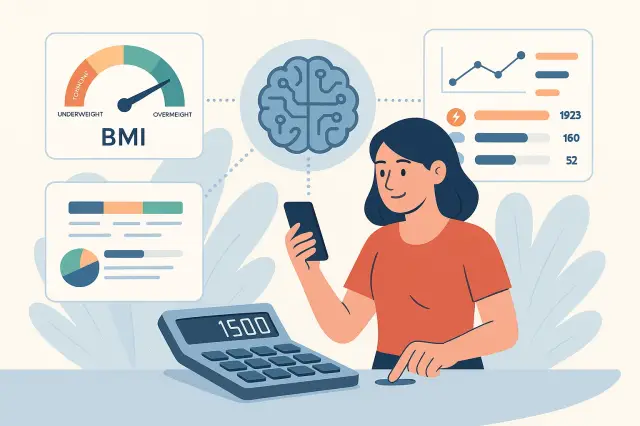Why Smart Weight Goals Matter in 2025
Weight management is no longer just about counting calories — it’s about understanding your body’s unique needs and using technology to guide your journey. In 2025, artificial intelligence and personalized nutrition are reshaping how people set and reach their ideal weight.
Thanks to tools like the Ideal Weight Calculator, BMI Calculator, and Macronutrient Calculator, you can now calculate precise goals tailored to your body composition, activity level, and metabolic rate — all within seconds.
AI-based health tracking has made it easier than ever to understand what “healthy” truly means for you. Instead of following generic diets, you can define smart, />
The Rise of AI Nutrition and Personalized Health
AI nutrition refers to the use of algorithms and data analytics to create customized diet recommendations. These systems analyze factors like body type, age, gender, physical activity, and even genetics to design smarter nutritional plans.
In 2025, this trend is everywhere: fitness apps are powered by machine learning, smartwatches can estimate calorie burn in real time, and nutrition calculators can help you balance your macros for weight loss or muscle gain.
Using online tools like Calculatorr’s Macronutrient Calculator and Calorie Calculator, users can combine AI insights with precise math to reach measurable results faster.
How to Set Smart Weight Goals Step by Step
Setting realistic and measurable goals is key to long-term success. Here’s how to do it effectively using Calculatorr’s free online tools:
Step 1: Calculate Your Current Body Composition
Start by knowing where you stand. Use the BMI Calculator to determine your Body Mass Index. It helps you understand whether you are underweight, at a healthy weight, overweight, or obese according to international standards.
Formula:
BMI = Weight (kg) ÷ [Height (m)]²
Example:
If you weigh 70 kg and are 1.75 m tall:
BMI = 70 ÷ (1.75 × 1.75) = 22.86 (Healthy range)
Step 2: Find Your Ideal Weight
The next step is to use the Ideal Weight Calculator. This tool estimates the optimal weight range for your height, gender, and body frame.
It’s ideal for setting a target that supports both health and aesthetics. For instance, a person 1.70 m tall might have an ideal weight range between 60 and 65 kg.
This gives you a realistic benchmark rather than chasing unrealistic numbers or social media trends.
Step 3: Determine Your Daily Calorie Needs
Once you know your goal, use the Calorie Calculator to find out how many calories you should consume daily.
The calculator considers:
-
Age
-
Gender
-
Height and weight
-
Activity level
-
Weight goal (lose, maintain, or gain)
It’s based on the Harris-Benedict formula, which estimates your Basal Metabolic Rate (BMR) and adjusts it for activity.
For example, if your goal is to lose weight, you should aim for a calorie deficit — usually 300 to 500 kcal less per day than your maintenance level.
Step 4: Adjust Your Macronutrients
Once your calorie target is clear, move to the Macronutrient Calculator.
This tool helps divide your daily intake into the right proportions of:
-
Protein: supports muscle repair and satiety
-
Carbohydrates: fuel for daily energy
-
Fats: essential for hormone balance and brain function
A typical balanced ratio for healthy weight loss is 40% carbs, 30% protein, and 30% fats — but AI tools can personalize this further according to your metabolism or fitness goals.
Example: A Smart Weight Plan in Action
Let’s look at a practical example of how someone could use Calculatorr’s tools to create an AI-inspired health plan.
| Profile | Details |
|---|---|
| Gender | Female |
| Age | 32 years |
| Height | 1.68 m |
| Weight | 72 kg |
| Activity Level | Moderate exercise (3-4 times/week) |
| Goal | Lose 4 kg in 8 weeks |
1. BMI Result: 25.5 → Slightly overweight
2. Ideal Weight Range: 59–65 kg
3. Daily Calorie Needs: ~1,950 kcal for maintenance → reduce to 1,500 kcal for gradual weight loss
4. Macronutrient Breakdown:
-
Protein: 113 g (30%)
-
Carbs: 150 g (40%)
-
Fats: 50 g (30%)
By using these numbers, she can plan meals and workouts tailored to her actual body data — no guesswork, just evidence-based goals.
The Role of AI in Nutrition Apps
Modern AI-powered nutrition systems go beyond numbers. They can now:
-
Analyze your eating habits through photos or meal logs.
-
Recommend recipes with exact calorie and macro values.
-
Integrate with wearable devices for real-time calorie tracking.
-
Provide predictive insights, e.g., “You’re likely to exceed your sodium intake today.”
These tools make the process of reaching and maintaining your ideal weight more accurate, motivating, and sustainable.
Common Mistakes When Setting Weight Goals
Even with great tools, some users struggle due to common mistakes. Here’s how to avoid them:
-
Setting unrealistic expectations: Losing more than 1 kg per week can be unhealthy.
-
Ignoring body composition: Weight alone doesn’t reflect muscle gain or fat loss.
-
Skipping macronutrient balance: Reducing calories drastically without the right nutrient mix leads to fatigue.
-
Not tracking progress: Use the Body Fat Calculator and BMI Calculator weekly to monitor results.
-
Underestimating rest: The Sleep Cycle Calculator can help you optimize rest for better recovery.
Practical Tips to Stay Consistent
To turn your weight goals into long-term results, consistency matters more than intensity. Try these strategies:
-
Use a planner: Combine the Habit Tracker with your fitness goals.
-
Track progress weekly: Recalculate BMI and calorie needs every few weeks.
-
Hydrate properly: Small water deficits can affect metabolism.
-
Reward small wins: Celebrate milestones to stay motivated.
-
Prioritize sleep: Poor sleep leads to hormonal imbalances that affect weight loss.
Integrating AI Nutrition Into Your Daily Routine
Start small — use one calculator at a time. Begin with your BMI, set a clear ideal weight, and track your progress with calorie and macronutrient calculators.
Then, gradually include wearable devices or AI-driven nutrition apps to sync with your daily data. The combination of human intuition and artificial intelligence makes 2025’s approach to wellness both smart and sustainable.




